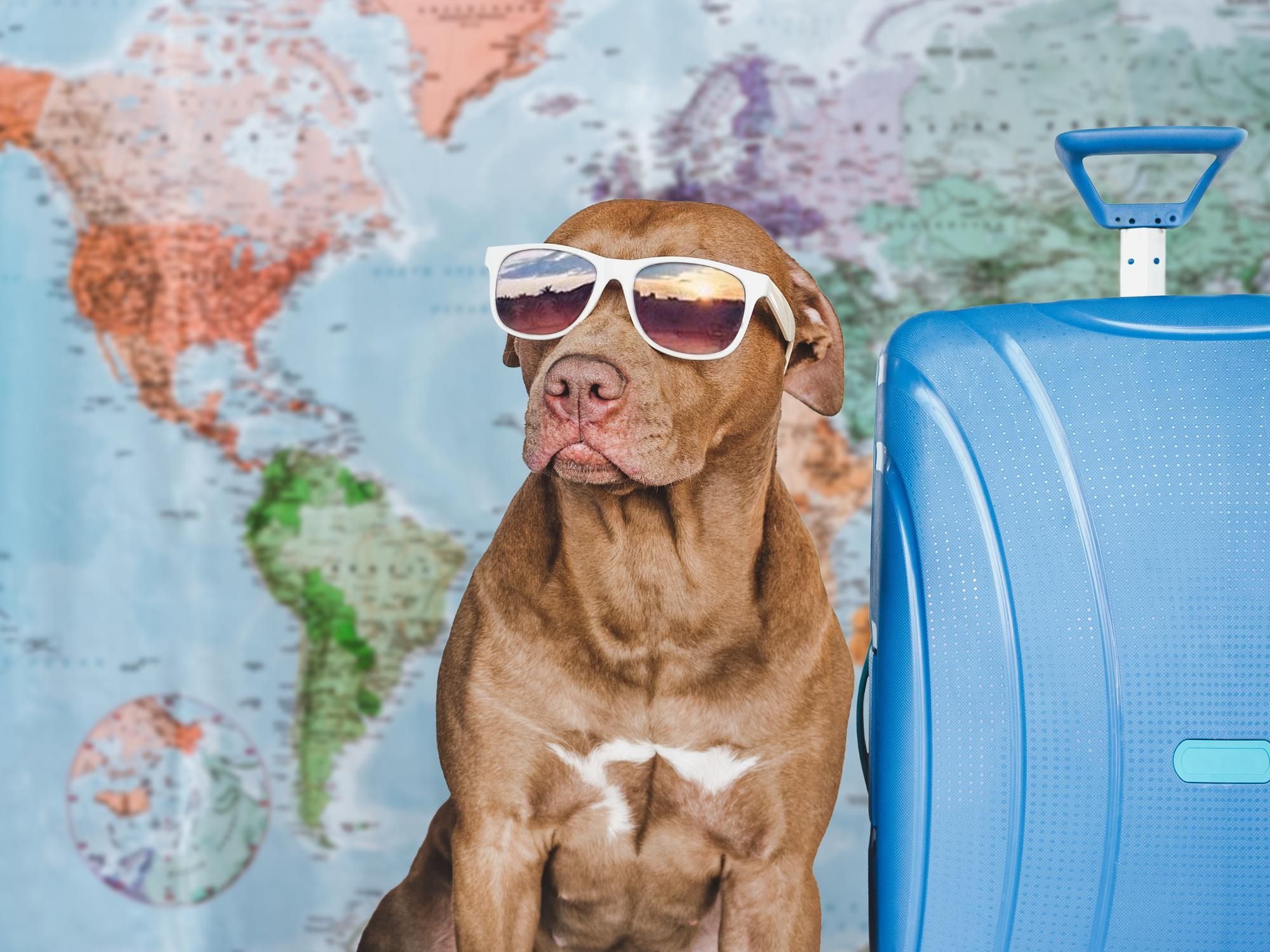International travel has become increasingly popular in recent years, and with it, the desire to bring beloved pets along for the journey. However, navigating the complex world of pet travel can be overwhelming, especially when it comes to obtaining a dog passport.
Barks Beyond Borders the Essential Guide to Dog Passports aims to demystify this process by providing a comprehensive overview of a dog passport, why it's necessary for international travel, and how to obtain one.
This guide will cover everything from the basics of a dog passport and how it differs from human passports to the specific requirements for obtaining one in different countries worldwide.
It will also explore alternative forms of documentation for traveling with pets and provide case studies from dog owners who have successfully traveled internationally with their furry companions.
Whether planning your first trip abroad with your pet or simply curious about the ins and outs of dog passports, Barks Beyond Borders is here to help.
Understanding the Concept of a 'Dog Passport'

The concept of a Dog Passport encompasses its definition, purpose, differentiation from human passports, and the current laws and regulations related to it in diverse countries.
A dog passport is an official document that verifies a dog's identity, ownership, and vaccination status. Its primary purpose is to allow dogs to travel across international borders without posing a risk to public health. The passport contains crucial information about the dog's breed, age, microchip number, rabies vaccination record, and other relevant details.
Unlike human passports that serve as proof of citizenship or nationality, dog passports only indicate the animal's identity and health status. They are mandatory for dogs entering certain countries or participating in overseas competitions or events.
The rules governing dog passports vary from country to country. In some nations like the European Union (EU), they are required for all dogs traveling within its member states. Other countries may have specific entry requirements that must be met before allowing a dog into their territory.
Pet owners must research these regulations beforehand to ensure compliance with local laws and avoid unnecessary delays or penalties when traveling with their furry companions.
Do Dogs Really Need Passports?

International travel with a canine companion raises the question of whether a pet passport is necessary. The answer depends on various factors, such as the destination country's regulations and the mode of transportation.

Generally, a pet passport proves that your dog has been vaccinated against certain diseases and meets the importing country's health requirements. It also contains information about your dog's breed, age, and microchip number for identification purposes.
Having a pet passport may be necessary for international travel to avoid quarantine or other restrictions upon arrival. Additionally, some airlines require it before allowing dogs to board their planes.
However, there are instances when a pet passport may not be required for traveling domestically or within the European Union (EU). Nevertheless, it is still recommended to carry one in case you encounter any unexpected situations during your travels.
Remember that while a pet passport can make crossing borders easier for you and your furry friend, it does not replace other crucial documents such as a health certificate or import permit required by some countries.
What are the International Dog Passport Requirements?
To travel with a canine companion internationally, it is important to comply with specific vaccination and health requirements outlined by the destination country.
A pet passport or health certificate is often required to prove the dog's health status and vaccination history. The most common requirement for international travel is a rabies vaccination, which must be administered at least 21 days before departure.
Additionally, some countries may require additional vaccinations or tests such as microchipping, blood tests for certain diseases, or treatment for specific parasites. It is essential to research the destination country's specific requirements well before travel.
Failure to comply with these regulations could result in quarantine or even denial of entry for the dog. It is also important to note that while a pet passport or health certificate may not always be necessary for domestic travel within certain countries, they are almost always required for international travel.
Thus, it is crucial for owners planning to take their dogs abroad to obtain all necessary documentation and ensure their pets are up-to-date on all required vaccinations and treatments before embarking on their journey.
How to Obtain a Dog Passport?
Obtaining documentation for canine travel involves meeting specific requirements and adhering to a procedure that can be both time-consuming and costly. To apply for a dog passport.
Pet owners must ensure their dogs meet the necessary health requirements such as being vaccinated against rabies, microchipped, and treated against tapeworms. The owner must provide proof of ownership and identity, such as a valid ID or passport.
The procedure for obtaining a dog passport varies by country. Still, it typically involves visiting a veterinarian to complete the necessary health checks before submitting an application to the relevant authority or agency. The timeline for receiving a dog passport also varies depending on the country of origin but can sometimes take several weeks or even months.
It is important to note that there are costs associated with obtaining these documents, including veterinary fees, application fees, and any additional expenses related to fulfilling the requirements. Therefore, pet owners must estimate these costs beforehand and manage them effectively to avoid any unexpected financial burdens during their travels.
The Role of Vaccinations and Health Checks
Vaccinations and health checks are crucial components in ensuring the safety of both dogs and humans during international travels. Most countries require proof that a dog has been vaccinated against rabies, as it is a serious and deadly disease that can be transmitted from animals to humans.
In addition to rabies, other common vaccinations are required for pet travel such as distemper, parvovirus, hepatitis, leptospirosis, and kennel cough. It is important to note that vaccination requirements vary by country and it is therefore advisable to research thoroughly before embarking on any travel with pets.
Veterinarians play an important role in the Dog Passport process as they administer the necessary vaccinations and provide health checks. They will also issue certificates that indicate that your dog is fit for travel.
Using a licensed veterinarian who understands the specific requirements of each country you intend to visit is essential. The validity period of these certificates also varies from country to country so it's important to keep track of expiration dates and plan accordingly.
In summary, obtaining proper vaccinations and health checks before international travel with your furry friend ensures their well-being and helps prevent the spread of diseases between different countries.
Alternatives to Dog Passports
When it comes to traveling with pets, alternative forms of documentation can be considered aside from the pet passport.
One such option is a health certificate issued by a veterinarian that contains information about your pet's vaccinations and overall health. This document may be required for domestic travel within certain countries or for international travel to destinations that do not have strict import requirements. However, it should be noted that the validity of a health certificate is generally shorter than that of a pet passport.
An import permit or license is another option for those looking to travel with their pets. These documents are specific to each country and may require additional paperwork or fees. While they may provide an alternative method of entry into certain countries, they do not offer the same level of convenience as a pet passport.
Ultimately, deciding what form of documentation to use when traveling with your dog or other pet will depend on your destination and individual circumstances. It's important to research the import requirements for each country you plan to visit and consult with your veterinarian before making any travel plans.

Case Studies of International Travel with Dogs
International travel with dogs can present unique challenges, and hearing from other dog owners who have successfully navigated this process can offer valuable insights and advice. Here are some case studies of international travel with dogs:
- One owner shared their experience traveling to the UK from the US with their two small dogs. They found that airlines had varying policies and fees for pets, and it was important to do research ahead of time. They also noted specific requirements for entering the UK, such as a microchip and rabies vaccination, which needed to be completed well before the trip.
- Another owner traveled from Australia to Europe with their large dog. They faced challenges in finding accommodations that allowed pets and navigating public transportation systems. However, they found that many European countries were more welcoming to dogs than they expected.
- Based on these case studies and others like them, here is some advice for dog owners planning international travel:
- Research airline policies thoroughly, ensure all necessary vaccinations and documentation are up-to-date.
- Consider pet-friendly accommodations when booking lodging; be prepared for potential language barriers or cultural differences regarding pets;
- - Bring familiar items from the home to help your pet feel comfortable during travel.
Frequently Asked Questions
Are there any breed-specific requirements for obtaining a Dog Passport?
There are no breed-specific requirements for obtaining a dog passport. However, certain breeds may face restrictions when traveling to certain countries due to local laws and regulations. For instance, pit bulls are not allowed in some countries like the UK and France.
Can a Dog Passport be used for domestic travel within a country?
A dog passport is primarily intended for international travel and serves as proof of vaccination and identification. Domestic travel within a country may not be necessary, but local regulations vary and should be checked with authorities.
How long is a Dog Passport valid for?
Much like a human passport, the validity of a dog passport varies depending on the issuing country. Generally, they are valid for 1-4 years. It is important to check with the specific country's regulations before traveling with your furry friend.
Are there any restrictions on the number of dogs that can travel together with a single passport?
There are no specific restrictions on the number of dogs that can travel together with a single passport. However, it is essential to adhere to the regulations set by the destination country regarding pet ownership and transportation.
What should I do if my dog's vaccination records are missing or incomplete?
If your dog's vaccination records are incomplete or missing, it is recommended to consult with a veterinarian to determine the necessary vaccinations. This ensures that your pet meets the vaccination requirements for travel and reduces the risk of spreading diseases. Like puzzle missing pieces, complete records are essential for safe travels.
Conclusion
Obtaining a dog passport is crucial for international pet travel. It serves as proof of the animal's identity and health status while adhering to different countries' regulations and requirements. While several alternatives may be available, they do not offer the same level of convenience and assurance as a dog passport.
As William Shakespeare once wrote, 'All the world's a stage.' Similarly, our furry companions are more than just animals; they are family members who deserve to explore and experience different parts of the world with us. With proper planning and preparation, obtaining a dog passport can help ensure that these adventures are safe, enjoyable, and memorable for both pet and owner alike.





